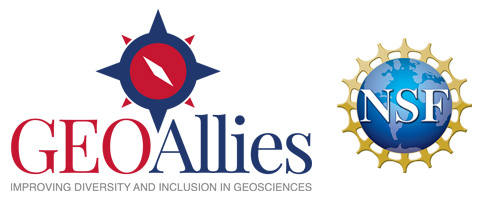Geoscience Diversity Problem
Like many STEM academic disciplines, geoscience has a base rate problem with respect to diversity (Bernard & Cooperdock, 2018). Undergraduate majors who are underrepresented (UR) are conspicuously missing, constituting only 18% of majors – the lowest of all STEM fields (American Geosciences Union, 2014).
Even fewer graduate students and tenure-track/tenured (TT/T) faculty progress: 10% of PhD degrees in geoscience are awarded to students of color, and they represent less than 4% of TT/T faculty positions (NSF, 2016). Despite recent gains in gender balance (Bernard & Cooperdock, 2018), Black and Hispanic undergraduate and graduate students, and those with disabilities (Feig et al., 2019), continue to be left out of geoscience (Goldberg, 2019).
Lack of Geoscience Undergraduates
Relatively few UR undergraduate majors enroll in geoscience, and the issue is exacerbated as scholars progress through their academic careers. This is a “pipeline problem” with many leaks along the way (Bernard & Cooperdock, 2018). For example, recent studies have identified that UR groups report feelings of isolation in the classroom and at professional meetings, and a lack of role models, even in textbooks (Bush & Mattox, 2020).
Field Trip Costs
Field trip costs, combined with a lack of experience in camping/hiking activities (O’Connell & Holmes, 2011), further limit UR students’ involvement. These issues are compounded with a lack of knowledge about financially stable career options in geoscience, and the scheduling constraints students may experience with family obligations, which are particularly relevant to first-generation college students (Stokes et al., 2014).
For UR students with disabilities, these trips can be made accessible with some foresight and accommodations (e.g., universal design; Feig et al., 2019).
Rather than focus research and intervention exclusively on promotion and advancement (Nittrouer et al., 2018), examination of the networks of the relatively few UR geoscience faculty conference acceptances (Ford et al., 2019), or discrepancies in published journal articles (Powell, 2017), when efforts may only address one part of the problem, we propose.
Our Proposed Study
We propose an experimental field study to assess the impact of an allyship program on the supportive allyship attitudes and behaviors, effective mentorship, and student performance of participating faculty and graduate students (academic allies), and their UR and majority students.
We accomplish this through longitudinal, multisource measurement centered primarily before and after the execution of academic field trips.
Academic field trips are a critical component in geoscience education and research (Giles et al., 2020). Further, due to their immersive nature (e.g., remoteness, time spent: day trips to several months), they are contexts rife with the opportunity for extremely negative or positive experiences (Nova Education, 2016; Wadman, 2017).
Our proposed study provides a mechanism to educate academic allies on effective allyship, prior to field efforts, and a space for them to practice, so that they transfer learnings to their trips. The outcomes have the possibility of being transformational: effective mentorship and ethical leadership could be role modeled (Bandura, 1986; Brown & Treviño, 2013) to UR and majority-member students on the trip, in a “train-the-trainer” model.
Academic Allies
The academic allies could additionally share with their peer networks what worked well, and further promote positive allyship behaviors, influencing the broader academic pipeline.
This is a National Science Foundation (NSF) funded project, and a collaboration between Texas Tech University and Rice University.
How to get involved
Reach out if you are interested in learning about or getting involved with our project.
